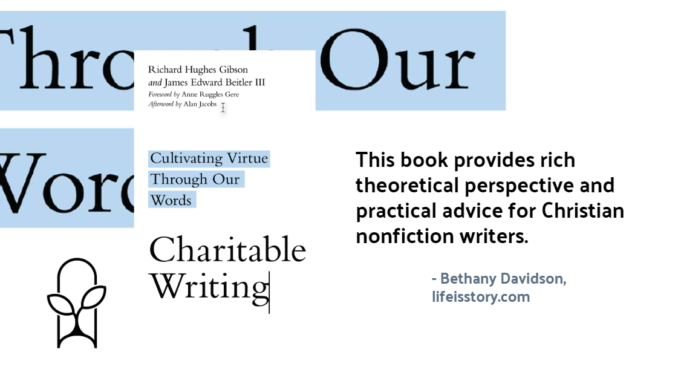
Published by IVP Academic on December 15, 2020
Genres: Academic, Non-Fiction, Christian Life, Writing
Buy on Amazon
Goodreads

Our written words carry weight. Unfortunately, in today's cultural climate, our writing is too often laced with harsh judgments and vitriol rather than careful consideration and generosity. But might the Christian faith transform how we approach the task of writing? How might we love God and our neighbors through our writing? This book is not a style guide that teaches you where to place the comma and how to cite your sources (as important as those things are). Rather, it offers a vision for expressing one's faith through writing and for understanding writing itself as a spiritual practice that cultivates virtue. Under the guidance of two experienced Christian writers who draw on authors and artists throughout the church's history, we learn how we might embrace writing as an act of discipleship for today--and how we might faithfully bear the weight of our written words.
In Charitable Writing, two English professors share insight into how Christian writing programs can encourage students to glorify God and love their neighbor through their writing. Richard Hughes Gibson and James Edward Beitler III taught English for years at a Christian university without using explicitly Christian materials, but began to consider ways that they could better bring their worldview to bear on their subject, in addition to using the best secular resources in their field. This book is the result of mutual exploration and provides rich theoretical perspective and practical advice, quoting from many traditional Christian thinkers such as Augustine and incorporating classical artwork that represents writing as part of the Christian life. The authors analyze the different ways that these sources conceptualize and model writing, and encourage their readers to see their work as directly connected to God and to other people, not as a solitary discipline.
Although Charitable Writing: Cultivating Virtue Through Our Words comes from an academic background, its theoretical underpinnings and practical suggestions apply to other Christian writers as well. I found the emphasis on writing with virtue helpful for my academic work in grad school, but I also enjoyed thinking through these principles in relation to my book reviewing and other nonfiction writing that I do. The authors show how our writing connects to our personal character, and they encourage their readers to listen well, engage charitably in writing communities, and develop clear, cogent arguments out of a sense of love. One of my favorite chapters is the one about argumentation, in which Gibson and Beitler show how a shift away from warfare metaphors can help people conceptualize argumentation in more constructive, loving, and positive ways.
This book is very unique, and is based in a rich tradition of Christian thinking, contemporary mainstream sources, and a broad focus that brings in wisdom and life examples from male and female writers from a variety of time periods, nations, and ethnic backgrounds. This is a great book for any Christian who writes nonfiction, and even though it comes from an academic paradigm, many of the same principles apply to people who run blogs, write nonfiction books, or write for their communities. I would also recommend this as a homeschool resource for older high school students who are serious about writing.
